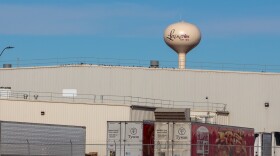-
Farm aid promised last December is still months away from being paid out to fruit and vegetable growers. But industry groups say it won't be enough to get them through tough market conditions.
-
In 2014, the U.S. Department of Agriculture created a network of "climate hubs" to understand how climate change affects agriculture and forestry and help farmers adapt to more extreme and unpredictable weather. Now, the future of these hubs is uncertain.
-
An invasive insect called the rice delphacid was a major problem for some farmers in 2025. With low prices for their crop and a high cost of doing business, many are wondering how they'll make a profit in 2026.
-
University of Illinois researchers analyzed traces of DNA in rivers and streams to learn how strips of trees near water — called riparian buffers — impact land species.
-
The U.S. Department of Agriculture plans to send "bridge" payments to farmers who grow soybeans, cotton and other crops before March. Commodity groups and economists say the aid brings relief to farmers and their lenders, but they need long-term solutions.
-
Industry experts say interest in protein consumption among consumers is likely driving growth in whole milk sales. But the trend may be a blip in the ongoing decline in U.S. milk consumption.
-
Farmers across the central U.S. have navigated a myriad of challenges this year, including low crop prices and federal funding cuts.
-
The announcement that Tyson would shutter a massive beef processing plant in Nebraska was the first such closure in more than a decade. Beef processors are running at lower capacity, as the U.S. cattle herd size is the smallest it's been since the 1950s.
-
The lesser prairie chicken was once a common sight in the southern Great Plains, but its numbers are dwindling. Even so, it lost federal protections earlier this year for a second time. Now states and landowners are overseeing conservation efforts
-
Congress extends critical Farm Bill for a third time. It's a relief for farmers, but raises concernsThe federal funding package to reopen the government included a one-year extension of certain 2018 Farm Bill programs. Several expired Sept. 30 or would have been null by the end of the year.

Play Live Radio
Next Up:
0:00
0:00
Available On Air Stations










